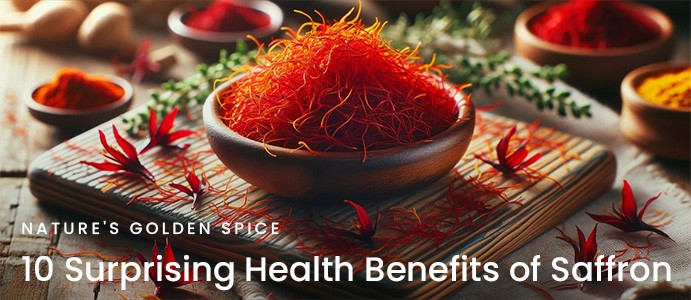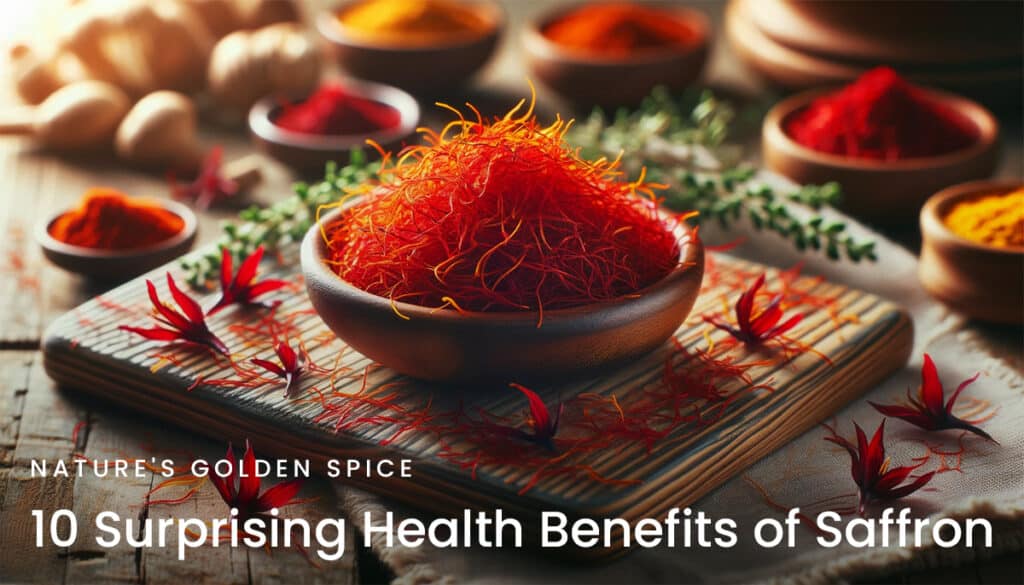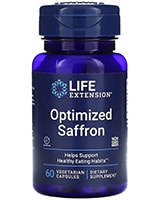

Introduction
Saffron, known scientifically as Crocus sativus, is esteemed for its unique properties and is among the most costly spices, alongside vanilla and cardamom. Its origins trace back to the Middle East, and it has been valued in various cultures for culinary and medicinal uses. This article aims to explore the health benefits of saffron, supported by scientific studies and traditional usage.
The 10 Surprising Health Benefits of Saffron
1. Mood Enhancement and Antidepressant Effects
Research indicates that saffron may play a role in mood enhancement and treating depressive symptoms[1]Marx, W., Lane, M., Rocks, T., Ruusunen, A., Loughman, A., Lopresti, A., Marshall, S., Berk, M., Jacka, F., & Dean, O. M. (2019). Effect of saffron supplementation on symptoms of depression and anxiety: a systematic review and meta-analysis. Nutrition Reviews, 77(8), 557-571. https://doi.org/10.1093/nutrit/nuz023. Studies suggest that compounds in saffron, such as crocin and safranal, may have antidepressant properties by interacting with the serotonin system in the brain[2]Shafiee, M., Arekhi, S., Omranzadeh, A., & Sahebkar, A. (2018). Saffron in the treatment of depression, anxiety and other mental disorders: Current evidence and potential mechanisms of action. Journal of Affective Disorders, 227, 330-337. https://doi.org/10.1016/j.jad.2017.11.020. Clinical trials have shown that saffron can be comparable to conventional antidepressants for mild to moderate depression, often with fewer side effects. However, it’s important to note that dosage and individual responses can vary, and saffron is not a substitute for professional medical advice.
2. Antioxidant Properties
Saffron’s antioxidant properties are attributed to compounds like crocin, crocetin, and safranal[3]Cerdá-Bernad, D., Valero-Cases, E., Pastor, J.-J., & Frutos, M. J. (2022). Saffron bioactives crocin, crocetin and safranal: effect on oxidative stress and mechanisms of action. Critical Reviews in Food Science and Nutrition, 62(12), 3232-3249. https://doi.org/10.1080/10408398.2020.1864279. These antioxidants help neutralize harmful free radicals and protect cells from oxidative stress, which is linked to chronic diseases. While saffron’s antioxidant effects are notable, it’s important to consider them as part of a balanced diet and lifestyle for overall health benefits.
3. Potential Anti-Cancer Effects
Saffron may show activity against certain cancer cell lines in lab settings. Preliminary studies, primarily conducted in vitro and on animal models, suggest that saffron and its components might have some inhibitory effects on cancer cells[4]Shakeri, M., Tayer, A. H., Shakeri, H., Jahromi, A. S., Moradzadeh, M., & Hojjat-Farsangi, M. (2020). Toxicity of saffron extracts on cancer and normal cells: A review article. Asian Pacific Journal of Cancer Prevention, 21(7), 1867-1875. https://doi.org/10.31557/APJCP.2020.21.7.1867. These studies have observed that saffron extracts can induce apoptosis in cancer cells. However, it’s important to remember that these findings are preliminary and cannot translate directly to therapeutic benefits in humans. While inducing apoptosis is a desired outcome in cancer treatment, further research, especially in human trials, is needed to understand the specific mechanisms and potential clinical implications.
4. Heart Health and Blood Pressure Regulation
Saffron may hold the potential to contribute to heart health and blood pressure regulation. Early research indicates that the antioxidant properties of saffron might play a role in managing blood cholesterol levels and supporting overall cardiovascular health[5]Ghaffari, S., & Roshanravan, N. (2019). Saffron; An updated review on biological properties with special focus on cardiovascular effects. Biomedicine & Pharmacotherapy, 109, 21-27. https://doi.org/10.1016/j.biopha.2018.10.031. Some studies have also suggested a potential effect on lowering blood pressure. However, these studies are preliminary, and more robust and long-term research is needed to verify these effects and elucidate the exact mechanisms. While some studies suggest these possibilities, it’s crucial to approach these findings with caution and not to make specific health claims about preventing blood vessels from clogging.
5. Memory and Cognitive Enhancement
Preliminary research indicates that saffron may have a role in enhancing memory and cognitive function. Some studies suggest that active compounds in saffron, particularly crocin, could potentially improve cognitive performance[6]Ali, A., Yu, L., Kousar, S., Khalid, W., Maqbool, Z., Aziz, A., Arshad, M. S., Aadil, R. M., Trif, M., Riaz, S., Shaukat, H., Manzoor, M. F., & Qin, H. (2022). Crocin: Functional characteristics, extraction, food applications and efficacy against brain related disorders. Frontiers in Nutrition, 9, 1009807. https://doi.org/10.3389/fnut.2022.1009807. This has been observed in both healthy adults and those experiencing age-related cognitive decline. However, these studies are small and more extensive research is needed to confirm these findings and understand the long-term effects of saffron on cognitive function. It’s crucial to approach these results with caution and not overstate saffron’s efficacy in treating specific cognitive impairments.
6. Vision Health and Eye Care
Saffron may hold the potential to support vision health and eye care. Some clinical trials and research studies suggest that saffron might help improve vision in individuals with age-related macular degeneration (AMD)[7]Broadhead, G. K., Grigg, J. R., McCluskey, P., Hong, T., Schlub, T. E., & Chang, A. A. (2019). Saffron therapy for the treatment of mild/moderate age-related macular degeneration: a randomised clinical trial. Graefe’s Archive for Clinical and Experimental Ophthalmology, 257(1), 31-40. https://doi.org/10.1007/s00417-018-4163-x. The antioxidants in saffron, especially crocin, are believed to contribute to eye health, potentially slowing the progression of AMD. However, these results are preliminary, and larger and longer-term studies are needed to confirm saffron’s effectiveness in improving vision and preventing AMD progression. The exact mechanism behind saffron’s potential benefits for vision is still being explored.
7. Weight Loss and Appetite Control
Some research suggests saffron could assist in weight management, particularly in appetite control, but its role may be limited. Initial studies indicate that saffron might help reduce snacking and curb appetite, which could be beneficial for weight loss[8]Raman, R. (2023, February 1). 11 impressive health benefits of saffron. Healthline. Medically reviewed by Meacham, J., Ph.D., RD, PMP, MBA, CSCS. Retrieved from https://www.healthline.com/nutrition/saffron. The relationship between saffron, mood, and eating behaviour is currently speculative and requires further investigation. Extensive long-term studies are necessary to establish a more definitive understanding of saffron’s impact on weight management and appetite control.
8. Sexual Health and Libido
There is some limited evidence suggesting the potential benefits of saffron on sexual health and libido. Preliminary research, including small-scale clinical trials, has explored saffron’s potential to improve sexual function[9]Maleki-saghooni, N., Mirzaeii, K., Hosseinzadeh, H., Sadeghi, R., & Irani, M. (2018). A systematic review and meta-analysis of clinical trials on saffron (Crocus sativus) effectiveness and safety on erectile dysfunction and semen parameters. Avicenna Journal of Phytomedicine, 8(3), 198-209. Retrieved from https://www.ncbi.nlm.nih.gov/pmc/articles/PMC5987435/. However, these studies are preliminary and more diverse research is needed to confirm these findings. The link between saffron’s mood-enhancing effects and improved sexual function is an area of ongoing research, and it’s important to maintain neutrality and not imply a direct causal relationship.
9. Skin Health and Protection
Saffron’s antioxidant properties have been the subject of studies exploring its potential benefits for skin health and protection. These preliminary studies suggest that saffron might help protect the skin against UV radiation and reduce signs of aging[10]Golmohammadzadeh, S., Jaafari, M. R., & Hosseinzadeh, H. (2010). Does saffron have antisolar and moisturizing effects? Iranian Journal of Pharmaceutical Research, 9(2), 133-140. Retrieved from https://www.ncbi.nlm.nih.gov/pmc/articles/PMC3862060/. However, these studies are small and short-term, and it’s unclear how these findings might translate to long-term skin health improvements. At this stage, without conclusive evidence, it’s important to avoid making claims about saffron’s efficacy in treating specific skin conditions.
10. Menstrual Symptoms and PMS Relief
Some studies suggest that saffron might be beneficial in alleviating symptoms of premenstrual syndrome (PMS) and menstrual discomfort[11]Pirdadeh Beiranvand, S., Shams Beiranvand, N., Behboodi Moghadam, Z., Birjandi, M., Azhari, S., Rezaei, E., Salehnia, A. N., & Beiranvand, S. (2016). The effect of Crocus sativus (saffron) on the severity of premenstrual syndrome. European Journal of Integrative Medicine, 8(1), 55-61. https://doi.org/10.1016/j.eujim.2015.06.003. Research has indicated potential reductions in PMS symptoms, such as mood swings and physical discomfort, with saffron use. However, more research is needed to determine the safe and effective dosage for PMS relief and to understand any potential side effects. The current findings are based on limited research, and extensive studies are required for a more definitive understanding of saffron’s role in managing menstrual symptoms.
In conclusion, while the potential health benefits of saffron are promising, they should be approached with a balanced perspective. The current research is in the early stages for many of these applications, and further studies are necessary to fully understand the extent of saffron’s health benefits. It is advisable to consult healthcare professionals before using saffron for medicinal purposes and to consider it as part of a broader approach to health and wellness.
Buy Saffron Online Review Comparison Table
| Product | Company | Quantity | Price | Country | Website |
 Optimized Saffron | iHerb | 60 pills (88.25mg) | $27.00 |  Worldwide, AU | Visit Website >> |
References
| ↑1 | Marx, W., Lane, M., Rocks, T., Ruusunen, A., Loughman, A., Lopresti, A., Marshall, S., Berk, M., Jacka, F., & Dean, O. M. (2019). Effect of saffron supplementation on symptoms of depression and anxiety: a systematic review and meta-analysis. Nutrition Reviews, 77(8), 557-571. https://doi.org/10.1093/nutrit/nuz023 |
|---|---|
| ↑2 | Shafiee, M., Arekhi, S., Omranzadeh, A., & Sahebkar, A. (2018). Saffron in the treatment of depression, anxiety and other mental disorders: Current evidence and potential mechanisms of action. Journal of Affective Disorders, 227, 330-337. https://doi.org/10.1016/j.jad.2017.11.020 |
| ↑3 | Cerdá-Bernad, D., Valero-Cases, E., Pastor, J.-J., & Frutos, M. J. (2022). Saffron bioactives crocin, crocetin and safranal: effect on oxidative stress and mechanisms of action. Critical Reviews in Food Science and Nutrition, 62(12), 3232-3249. https://doi.org/10.1080/10408398.2020.1864279 |
| ↑4 | Shakeri, M., Tayer, A. H., Shakeri, H., Jahromi, A. S., Moradzadeh, M., & Hojjat-Farsangi, M. (2020). Toxicity of saffron extracts on cancer and normal cells: A review article. Asian Pacific Journal of Cancer Prevention, 21(7), 1867-1875. https://doi.org/10.31557/APJCP.2020.21.7.1867 |
| ↑5 | Ghaffari, S., & Roshanravan, N. (2019). Saffron; An updated review on biological properties with special focus on cardiovascular effects. Biomedicine & Pharmacotherapy, 109, 21-27. https://doi.org/10.1016/j.biopha.2018.10.031 |
| ↑6 | Ali, A., Yu, L., Kousar, S., Khalid, W., Maqbool, Z., Aziz, A., Arshad, M. S., Aadil, R. M., Trif, M., Riaz, S., Shaukat, H., Manzoor, M. F., & Qin, H. (2022). Crocin: Functional characteristics, extraction, food applications and efficacy against brain related disorders. Frontiers in Nutrition, 9, 1009807. https://doi.org/10.3389/fnut.2022.1009807 |
| ↑7 | Broadhead, G. K., Grigg, J. R., McCluskey, P., Hong, T., Schlub, T. E., & Chang, A. A. (2019). Saffron therapy for the treatment of mild/moderate age-related macular degeneration: a randomised clinical trial. Graefe’s Archive for Clinical and Experimental Ophthalmology, 257(1), 31-40. https://doi.org/10.1007/s00417-018-4163-x |
| ↑8 | Raman, R. (2023, February 1). 11 impressive health benefits of saffron. Healthline. Medically reviewed by Meacham, J., Ph.D., RD, PMP, MBA, CSCS. Retrieved from https://www.healthline.com/nutrition/saffron |
| ↑9 | Maleki-saghooni, N., Mirzaeii, K., Hosseinzadeh, H., Sadeghi, R., & Irani, M. (2018). A systematic review and meta-analysis of clinical trials on saffron (Crocus sativus) effectiveness and safety on erectile dysfunction and semen parameters. Avicenna Journal of Phytomedicine, 8(3), 198-209. Retrieved from https://www.ncbi.nlm.nih.gov/pmc/articles/PMC5987435/ |
| ↑10 | Golmohammadzadeh, S., Jaafari, M. R., & Hosseinzadeh, H. (2010). Does saffron have antisolar and moisturizing effects? Iranian Journal of Pharmaceutical Research, 9(2), 133-140. Retrieved from https://www.ncbi.nlm.nih.gov/pmc/articles/PMC3862060/ |
| ↑11 | Pirdadeh Beiranvand, S., Shams Beiranvand, N., Behboodi Moghadam, Z., Birjandi, M., Azhari, S., Rezaei, E., Salehnia, A. N., & Beiranvand, S. (2016). The effect of Crocus sativus (saffron) on the severity of premenstrual syndrome. European Journal of Integrative Medicine, 8(1), 55-61. https://doi.org/10.1016/j.eujim.2015.06.003 |

Leave a Reply